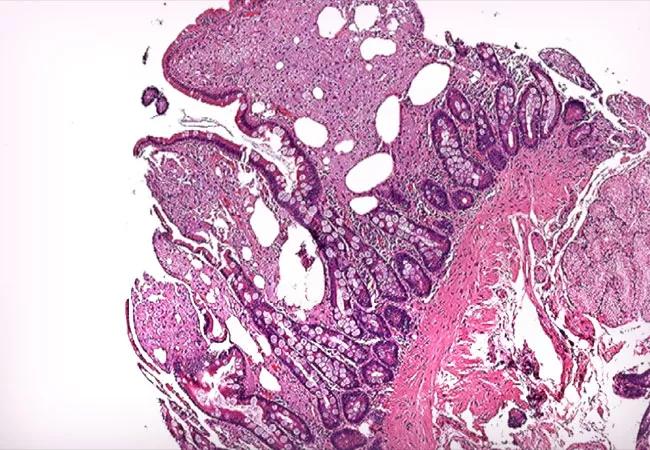What’s the diagnosis?

A male patient in his 60s presents with a one-year history of episodic wrist and metacarpal joint pain suggestive of rheumatoid arthritis. He had negative serologies, but his c-reactive protein was elevated consistently over the course of the year. He is complaining of a new symptom: left-sided chest pain, which gets worse with breathing and laying on his side. With a history of tobacco use and a 40-pound weight loss in the last six months, the team was concerned for a possible malignancy. What’s causing this patient’s inflammatory arthritis and weight loss?
Advertisement
Cleveland Clinic is a non-profit academic medical center. Advertising on our site helps support our mission. We do not endorse non-Cleveland Clinic products or services. Policy
Watch as Adam Brown, MD, staff in Cleveland Clinic’s Department of Rheumatic and Immunologic Diseases, describes the case, treatment and outcomes.
Video content: This video is available to watch online.
View video online (https://www.youtube.com/embed/dJFeFSPsDsk?feature=oembed)
What’s Causing the Inflammatory Arthritis & Weight Loss?
Whipple disease is a rare systemic disease with a very low incidence rate worldwide. Thus, its prevalence is difficult to estimate accurately. It is caused by a gram-positive bacterium, Tropheryma whippelii. The typical clinical manifestations are diarrhea, abdominal pain, weight loss, and fever. In most patients, these are often preceded by articular symptoms. The pathogenesis of Whipple disease is thought to be related to bacterial replication within macrophages, which leads to a systemic immune response and tissue infiltration by the organism. Histologic evaluation is the most common way to confirm the diagnosis. Whipple disease should be part of the differential diagnosis of arthritis, as antibiotic therapy alone leads to a dramatic clinical response.
“It takes a prolonged course [of antibiotics], but this patient completely recovered of all the symptoms, including the weight loss – completely recovered and is doing well,” says Dr. Brown. He notes that it is important to remember that “there’s a curable cause of inflammatory arthritis that can be lifesaving if picked up.”
Advertisement
Advertisement

A conversation with Leonard Calabrese, DO

The case for continued vigilance, counseling and antivirals

High fevers, diffuse rashes pointed to an unexpected diagnosis

No-cost learning and CME credit are part of this webcast series

Summit broadens understanding of new therapies and disease management

Program empowers users with PsA to take charge of their mental well being

Nitric oxide plays a key role in vascular physiology

CAR T-cell therapy may offer reason for optimism that those with SLE can experience improvement in quality of life.